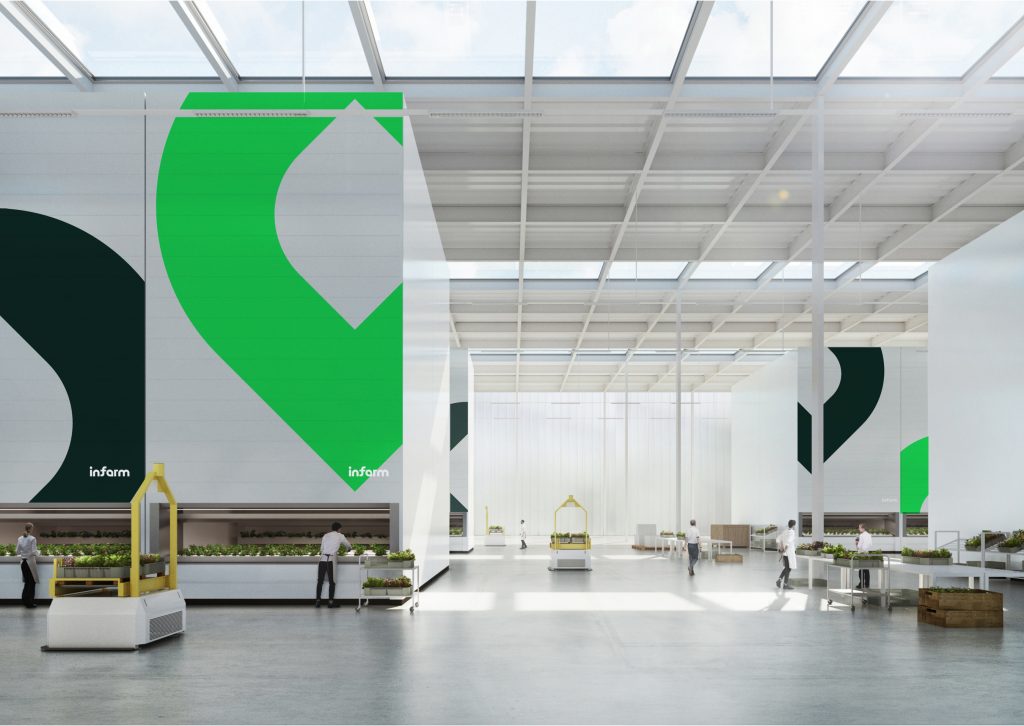
News
Structures & Equipment
Trends
Vegetables
Infarm raises $200M to expand global network of vertical farms
December 16, 2021 By Infarm
 An Infarm Growing Center (IGC). Photo credit: Infarm
An Infarm Growing Center (IGC). Photo credit: Infarm Infarm announced that it has raised $200 million in funding to expand globally.
The additional capital will serve to expand the deployment of the company’s vertical farms in the U.S., Canada, Japan and Europe, and to enter new markets in Asia-Pacific and the Middle East with both in-store farming units and Infarm Growing Centers.
By 2030, the company plans to increase its presence to 100 Growing Centers in 20 countries.
In 2023, Infarm will open its first Growing Center in Qatar, where it will harvest tomatoes, strawberries and other fruiting crops besides herbs, salads and leafy greens.
“This strategic investment will support our rapid global expansion and bolster our R&D so that we can grow more varieties of crops close to consumers across Europe, Asia, North America and the Middle East,” says Erez Galonska, co-founder and CEO of Infarm.
According to Mansoor bin Ebrahim Al-Mahmoud, CEO of QIA, their company is actively supporting activities around climate transition and technology.
“We see vertical farming as a way to enhance food security in every part of the world. We look forward to working with Infarm to develop their first Growing Centre in Qatar, which will contribute to Qatar’s own food security and economic diversification.”
Infarm Growing Centers are Infarm’s flagship production units. The spaces connect multiple vertical farming modules, offering the equivalent of about 110,000 ft2 of growing capacity, with a distribution center that ensures quick delivery to supermarkets.
Infarm also builds smaller in-store farming units for grocery stores, making the shopping experience more dynamic for consumers. Both designs were developed to maintain superior freshness while consuming considerably fewer resources than soil-based agriculture.
In addition to the more than 75 different varieties of herbs, salads and leafy greens Infarm currently produces, the company is working to expand its portfolio with 40 new crops next year such as mushrooms, cherry tomatoes, peas and strawberries.
Infarm’s cloud-connected farming network can be scaled rapidly.
According to the company, their proprietary modular technology can be deployed in as little as six weeks to transform a space the size of a living room 43 ft2 into an urban vertical farm that produces more than 500,000 plants per year – the equivalent of a football field-worth of crops. This new farming model can be 400 times more efficient than soil-based agriculture and uses no chemical pesticides. It requires 95% less land and uses 95% less water by recycling water and nutrients and using the evaporated water of the plants. Because crops are grown directly in cities, they also require 90% fewer food miles to get to consumers’ plates.
Each farm is equipped with numerous lab-grade sensors that have collected more than 60 billion data points from its global farming network. The farms upload information to the company’s cloud, the so-called “farm brain.”
Infarm’s crop science team analyses the data to continuously update the growing environment in each module and improve factors like yield, quality and nutritional value through the use of artificial intelligence and its patented technology. In the last three years, through the analyses made possible by the “farm brain”, the company reduced production costs by 80% and improved yield by more than 250%.
Since its launch, Infarm has expanded to more than 50 cities across 11 countries in Europe, North America and Asia. It operates more than 17 Growing Centers and over 1,400 in-store farms for 30 of the world’s retailers.
Print this page